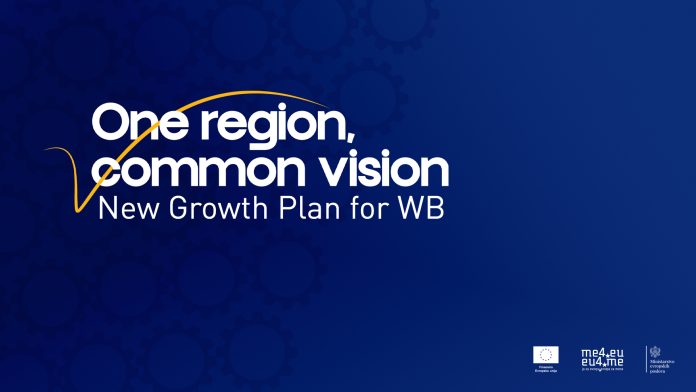The European Commission’s Growth Plan for the Western Balkans represents a significant opportunity for the accelerated development of the countries from the region and the intensification of the EU accession process. The clear commitment of regional countries to implementing reforms, along with the EU’s readiness to assist in key areas and increase project funding, will contribute to achieving long-term and sustainable results, further transforming and developing the region, and speeding up its integration into the EU. This message was conveyed during the ministerial meeting on the Growth Plan for the Western Balkans held in Podgorica.
The meeting was attended by Valentina Superti, Director for the Western Balkans at the Directorate-General for Neighborhood and Enlargement Negotiations, as well as ministers of European affairs and finance from the region. Kosovo was represented by Deputy Prime Minister Besnik Bislimi, while Deputy Finance Minister Filip Nikolovski represented North Macedonia. The Albanian government delegation included State Minister and Chief Negotiator Majlinda Dhuka and Finance Minister Ervin Mete. The Serbian government was represented by Minister of European Integration Tanja Miščević, and Bosnia and Herzegovina was represented by Assistant Director of the Directorate for European Integration Zara Halilović.
Opening the meeting, Minister of European Affairs Maida Gorčević said that the initiatives proposed by the EU, related to access to the Single Euro Payments Area (SEPA), the implementation of Green Corridors, and the establishment of the Single Market Academy, combined with national reform plans, aim to accelerate our progress toward gradual integration into the EU single market.
Gorčević also highlighted the importance of continuous EU assistance in infrastructure development, which, as she emphasized, should be continued and expanded under the Instrument for Pre-Accession Assistance for the Western Balkans.
“Montenegro’s intention is to accelerate the development of key infrastructure in the areas of transport and energy, which will have positive effects on growth rates. I am confident that the decision on the list of priority infrastructure projects eligible for funding under the Growth Plan, with the first priority being the 44 proposed infrastructure projects in education at all levels, was responsible and will help improve conditions in the education system, as this is the best possible investment in the future of young people,” said the Minister.
She affirmed that Montenegro’s European commitment is unquestionable and that the Government is dedicated to accelerating the EU accession process.
“During this specific period, when we have been diligently working to demonstrate progress in the rule of law under Chapters 23 and 24, we have also prepared a series of solid reform measures for other relevant areas of the Reform Agenda. I am confident that, if implemented with the same ambitious spirit, these reforms will transform Montenegrin society in a truly European way, while creating conditions for increased growth,” Gorčević stated.
Finance Minister Novica Vuković emphasized that joining the Single European Market is one of the Government of Montenegro’s priorities, and that after intensive and comprehensive activities to meet the membership requirements, Montenegro submitted its application for SEPA in March this year.
“Our priorities within the Reform Agenda primarily relate to improving the business environment, through measures aimed at enhancing governance in state-owned enterprises, strengthening transparency in public procurement, and a set of reform measures in tax policy and strengthening the capacities of the Tax Administration, we aim to improve the regulatory framework and remove obstacles to the development of the private sector and the economy as a whole,” said Vuković.
He noted that the Government is working on improving oversight and corporate governance of state-owned enterprises, which will ensure more profitable operations, more efficient use, and greater transparency in employment policies, more socially responsible business practices, and more efficient service to citizens.
To ensure fair, competitive, transparent, and financially responsible public procurement, additional control mechanisms are planned, including strengthening the e-procurement system, linking the e-procurement system with the electronic systems of the Agency for the Prevention of Corruption and the Competition Protection Agency, as well as the Ministry of Justice system.
“The expert and technical support of the European Commission and EU member states in these activities will be of immeasurable importance for our further progress in implementing reforms and simultaneously strengthening capacities and preparing for EU membership,” said the Finance Minister.
EU Ambassador to Montenegro Oana Cristina Popa stated that the European Union is working with the Western Balkans to ensure the Growth Plan is realized and brings tangible benefits to citizens and businesses.
“Earlier this week, in Brussels, the European Parliament gave the green light to a €6 billion Reform and Growth Fund, which will incentivize the reforms needed for growth,” Popa said.
Speaking about access to the EU single market, one of the topics of the ministerial meeting, Popa noted that real progress has been made concerning applications for the Single Euro Payments Area (SEPA).
“This could bring benefits of €500 million annually in savings on international transfers. Further priorities include digital identity wallets, facilitating the export of industrial products, and bringing the Western Balkans into the EU system to ensure the supply of critical medicines for its citizens,” said the Ambassador.
Ministers of European affairs and finance from the Western Balkans exchanged views on joint actions, coordinated policies, and initiatives aimed at ensuring the success of the Growth Plan and the overall EU accession process. In this context, discussions covered access to the Single Euro Payments Area (SEPA), improving trade and transport facilitation between Western Balkan countries and EU member states, the Digital Identity Wallet application, and enhancing the supply of critical medicines.
Following the ministerial meeting in Podgorica, Montenegro will host a regional Summit of Western Balkan leaders and the European Commission in mid-May, dedicated to maximizing the benefits of the Growth Plan, aiming to bring the Western Balkans closer to the EU single market, deepen regional economic integration, accelerate fundamental reforms, and increase financial assistance.


